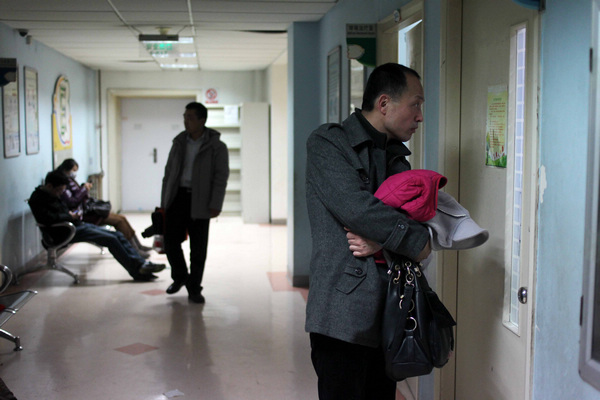Supervision demand
Creating a better compensation system is just one reform for public hospitals, said Chen Zhu, who added that authorities should also strengthen their supervision of treatments and spending with performance appraisals.
 |
|
The Capital Institute of Pediatrics is one of the busiest hospitals in Beijing. [Wang Jing / China Daily] |
The health bureau in Shanghai's Minhang district launched a computer network to collate real-time data on its hospitals in 2010. It allows officials to evaluate the quality and safety of clinical facilities and treatments, such as the amount of antibiotics prescribed by doctors.
Appraisal reports are produced every three months and play a major role in maintaining discipline, as well as decisions on funding.
Minhang's public hospitals, which shared more than 400 million yuan from the health bureau in 2011, are given annual targets and are judged on a series of indicators, such as the average amount spent per outpatient. If they fall short, their subsidies are reduced.
"Supervision of public hospitals (nationwide) must be improved," said Xu Su, director of the district health bureau. "Healthcare reform will succeed once government funds are allocated based on supervision. Only in this way will money play an effective role.
"The problem now is that government supervision is not in place and medical expenses are out of control," he added.
Zhenjiang has adopted a similar system to subsidize hospitals based on the number of outpatients, while the city also reduces funding for clinics where patients are prescribed an excessive amount of medication.
"When I was the president of a hospital, I used to fine doctors the same amount as the value of the excessive drugs they prescribed," said Lin Feng, director of the city health bureau. "Hospitals should not only encourage doctors with financial incentives but also restrain their behavior."
He disagreed with calls to entirely remove the markup on drugs, saying that the price should include the cost of storage, wastage and labor. With this in mind, he said an 8-percent hike on the purchase price is justifiable.
Lin added that the compensation system can also help balance out resources.
As Zhenjiang's latest medical insurance policy covers 90 percent of all medical expenses incurred at community health centers, compared with 60 percent at top hospitals, more patients are now using smaller facilities.
Jiankang Road Community Health Center, for example, saw the number of outpatients it handled increase from 160,000 in 2005 to 370,000 cases last year.
However, Zhu Chenping, deputy director of the center, said that just 36 employees have been recruited over the same period.
|
SOUND BITES "We should create a scientific performance appraisal system for medical institutions and personnel as soon as possible, rather than setting operational revenue targets, dividing the targets among all departments of a hospital, and evaluating a doctor based on how many outpatients he sees and how many drugs he prescribes. Today, hospitals are competing for profits and doctors are comparing how much money they make and how many papers they publish. This is not right. Hospitals should evaluate their doctors by the patients' degree of satisfaction, and by other factors such as their rationality of drug use and levels of medical treatment." ZHANG ZHEREN, vice-chairman of the Shanghai Committee of the Chinese Peasants' and Workers' Democratic Party and NPC deputy "The government should compensate hospitals by increasing investment and adjusting charges for medical services to reflect the value of doctors' skill. The rise in compensation can come from investment and medical insurance. Reforms in payment systems for medical services are also being carried out. Although it still takes time, we're heading in the right direction." WU MINGJIANG, vice-president of the Chinese Medical Association and CPPCC member "We need to increase the proportion of labor fees for doctors during treatments. (The government) should increase charges by an appropriate amount. In the meantime, the government should make clear how much revenue is lost by hospitals after the removal of the price markup and give compensation to ensure operation remains normal." LIU FENG, dean of Binzhou Medical University's nursing school and NPC deputy "If the appraisal system remains unchanged and a compensation system is not put in place, the hospitals can easily make profits from patients through unnecessary medical checks and excessive prescriptions." TAN JIEQING, dean of Hefei University of Technology's international education college and NPC deputy |
Contact the writers at jiangxueqing@chinadaily.com.cn and yangwanli@chinadaily.com.cn.
